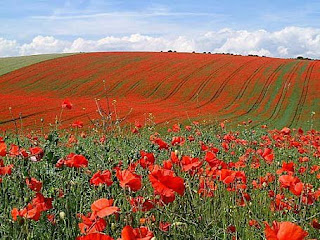Fr. Tony’s Midweek Message
Expansive Inclusion or Group
Advantage?
November 28, 2018
Today is the feast day of the Holy
Sovereigns, Blessed Kamehameha IV and Blessed Emma, King and Queen of the
Hawaiians, who died, respectively, in 1864 and 1885. Kamehameha as a young man traveled to
England, and was struck by the beautiful worship and gentle teaching of the
Church of England, and thought that it was better adapted to the spirit of
Hawaiians than was the dour Calvinism being pushed on them by missionaries from
North America. He invited Anglican missionaries
to establish the Anglican Church of Hawaii; Kamahameha and Emma helped found
St. Andrew’s Cathedral in Honolulu. The
Hawaiian people loved both of them deeply because they worked tirelessly for
the wellbeing, dignity, and security of Hawaiians. Emma was instrumental in establishing hospitals
and schools (still in operation) for the benefit of native Hawaiians, who were rapidly
becoming outcasts and wanderers in their own land. But in so doing, she specified that these
institutions should never exclude non-Hawaiians. What she called “the strangers in our midst”
were also to be served. Such “Aloha” is the glue that binds all the people of
the islands together. In building
these institutions to support the oppressed, Emma never made it a zero-sum game
by excluding non-Hawaiians.
Emma’s expansive inclusion is an
example of a teaching at the heart of our faith. There is a profound difference between how the
world sees things and how Jesus does. A
secular view often takes humanity as exclusive groups competing for a limited pool
of resources, with clear winners and losers.
Regardless of whether they are based in economic interest, race or
ethnicity, nationality, religion, party, or gender or other identities, such groups
in this view are in a life and death struggle: your gain is my loss, and vice
versa. Jesus teaches that we should love
our enemies because God gives blessing indiscriminately to various groups: the
rain and sunshine falls on wicked and righteous alike. “And that’s how you should be,” says Jesus
(Matt. 5: 43-48). In his view, God
increases blessings as we share them with others and welcome those not in our
own tribe. “Who is the neighbor whom I
should love?” asks the lawyer; Jesus replies with the story of the Samaritan
who makes a neighbor of his enemy by showing compassion across such divisions.
In a world where we are all in this
together, there is little room for exclusion and stingy hoarding of
resources. There is absolutely no room
for demonizing and dehumanizing others. The
solidarity Jesus calls us to fosters the common
good, equal opportunity, fair and reasonable distribution of the fruits of our
economic life, equity among people and nations, and peace in the world. It includes all the other principles and
values that are necessary to create and sustain a truly good society. It is at the heart of what it means to be
human, since we humans are essentially social beings, not isolated monads. It is more than a vague feeling of
compassion, common cause, or shallow sympathy.
It is in fact a commitment to our common life, a sign that we accept
responsibility for each other.
Emma’s inclusiveness has
applications for us today. In welcoming
and opening things up to this expansive solidarity, we must be careful to not
fall back into the trap of zero-sum exclusion, this time of the other side of
the tribal divide. One example is
this: many of our parishioners, myself
included, love to be addressed as sisters and brothers: identifying each other as siblings and
members of the family marks us as personally belonging to each other, and including
women on an equal footing as men broadens the welcome. Calling us sisters and brothers touches us
personally, because it connects to our identity. But I recently received a request from a dear
friend in the Church who self-identifies as gender non-binary (neither male nor
female, or maybe a little of each):
using “sisters and brothers” doesn’t include them, and feels like a micro-aggression. “Don’t
use this way of excluding me” they asked, “use ‘siblings, friends, beloved,’ or
some other way of intimate inclusion that actually does not exclude those of us
who do not share in the cis-hetero binary gendering of the world given us by
Patriarchy.”
While this request is heartfelt and
sincere, it focuses only on the exclusion experienced by enbies (non-binaries)
and not the inclusion (and personal intimacy) experienced by most men and women
in the Church when they hear “sisters and brothers.” By never
using “sisters and brothers,” we end up distancing most of those who hear
us. I hear my friend, and want to
include them in my speech habits. I will
use the pronouns they choose for themself.
I also want to respect the truth that inclusiveness is expansive, not
reductionist. It opens us for broader
expressions of love, and does not demand narrower or less personal ones. So in the spirit of blessed Queen Emma and
trying to pursue Jesus’ vision of a non-zero sum Reign of God, I will still use
“sisters and brothers,” and occasionally add “and all my siblings.” This is the basic theological reason I intend
to continue using masculine images for God (“Father, Son, and Holy Spirit”) when
rooted in scripture and tradition, but also will add similarly rooted gender
neutral and feminine images as well.
Grace and Peace
Fr. Tony+
Stained glass at The Cathedral
of St. Andrew in Honolulu. It depicts the arrival of Thomas Nettleship
Staley, received by King Kamehameha IV and Queen Emma. Staley was
appointed the first Bishop of Hawai'i in 1862.

























